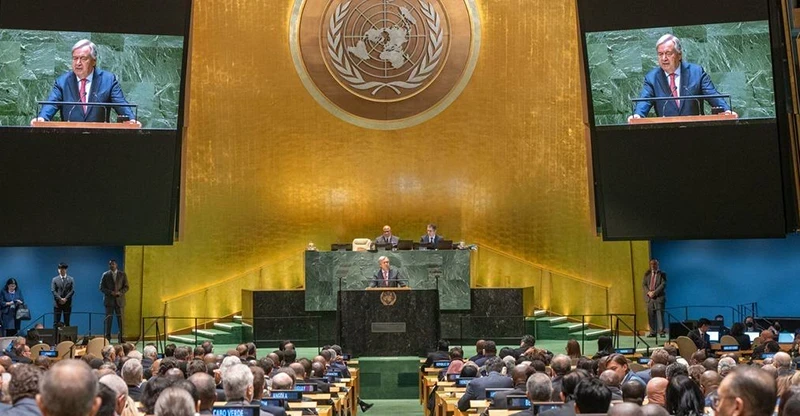Putting sustainable development on the right path
Taking place within the framework of the high-level week of the 78th session of the UN General Assembly in New York of the US, the Sustainable Development Goals (SDG) Summit marks the moment the world passes the halfway point, on the journey to realising the SDGs by 2030.
UN Secretary-General António Guterres called on countries to join hands and work to build a better future for everyone.
The world has reaped many encouraging results since the SDGs were officially adopted in 2015. The proportion of the global population with access to electricity increased from 87% in 2015, to 91% in 2021, as roughly an additional 800 million people accessed the electricity grid.
The number of internet users has increased by 65% since 2015, to 5.3 billion people connected by 2022. The energy transition has also recorded significant progress.
The world has reaped many encouraging results since the SDGs were officially adopted in 2015. The proportion of the global population with access to electricity increased from 87% in 2015, to 91% in 2021, as roughly an additional 800 million people accessed the electricity grid.
However, analysts said the above achievements are not enough to brighten the gloomy picture of the progress of implementing the SDGs. Speaking at the opening of the SDGs Summit, Secretary-General Antonio Guterres noted that efforts to complete the SDGs on time are facing difficulties.
Currently, only 15% of goals are on track, and many goals tend to be reversed. The world risks missing the SDGs if actions are not taken quickly.
The Food and Agriculture Organisation of the United Nations (FAO) recently warned that the world has a long way to go, to achieve the goal of completely ending hunger by 2030.
The FAO said that by 2022, about 29.6% of the global population, equivalent to 2.4 billion people, will be moderately or severely food insecure, up from 1.75 billion people in 2015. The countries in the southern hemisphere see the most severe malnutrition and famine in Africa's sub-Saharan region.
Meanwhile, the implementation of gender equality goals also faces challenges. In a recently released report titled “Progress on the Sustainable Development Goals: Gender Snapshot in 2023”, the UN emphasised that gender inequality in leadership and management still exists.
The FAO said that by 2022, about 29.6% of the global population, equivalent to 2.4 billion people, will be moderately or severely food insecure, up from 1.75 billion people in 2015. The countries in the southern hemisphere see the most severe malnutrition and famine in Africa's sub-Saharan region.
Secretary-General Antonio Guterres warned that it may take the world another 300 years to achieve the goal of gender equality. The head of the UN also listed a series of pressing problems globally today, such as rising pollution, 84 million children and young people not going to school and nearly 600 million people at risk of extreme poverty by 2030.
Analysts said climate change, world conflicts, the gloomy outlook for the global economy, and the persistent impact of the COVID-19 pandemic are the "cornerstones" that prevent or hinder progress in implementing the SDGs.
The UN pointed out that the impacts of the COVID-19 pandemic have increased the number of people living in extreme poverty. The Asian Development Bank (ADB) estimates that the COVID-19 pandemic and the inflation storm have pushed nearly 68 million people in Asia into extreme poverty, thereby weakening anti-poverty efforts.
Worryingly, the poor and vulnerable are people bearing the worst impact of unprecedented global challenges today. Difficulties pile up as the lack of resources causes the world to encounter obstacles in its efforts to turn the current situation.
The World Food Programme (WFP) is struggling to meet rising global food relief needs while funding for 2023 is more than 60% short, the highest shortfall in history. The WFP was forced to cut nearly half of its operations, including in relief hot spots, such as Afghanistan, Bangladesh, Haiti and Syria.
Secretary-General Antonio Guterres affirmed that eight years ago, the UN members adopted the SDGs in the context of the world's vicious cycle of poverty, illiteracy, epidemics, conflicts, climate change and psychological loss of faith in life. Therefore, the SDGs are not simply a list but contain hopes, ambitions, rights and expectations of the world.
Guterres called on leaders to join hands to overcome challenges and act stronger to fulfil promises to billions of people around the world.






